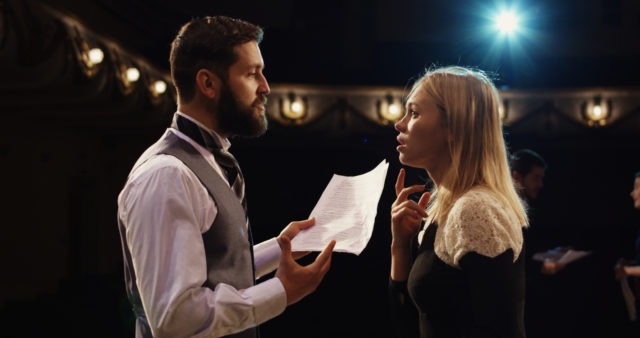
(This week is the 20thinstallment of the book, “The Band Director’s Lessons About Life”, which TCRN is publishing as a series during 2020. This week, band director and spiritual author Donald Lee relates a parable about how we become what we think, say, and do. So make sure you are “practicing” effectively every moment. For a complete listing of previous episodes in this series, click here.)
We Perform the Way We Practice
You can only fight the way you practice.
MIYAMOTO MUSASHI
(Japanese swordsman, philosopher, and writer)
“Jim, get up! You cannot rehearse a play while lying on the floor.”
“But we’re just going over our lines. I won’t actually do this in the play,” he complained.
“Jim, don’t be difficult. We perform the way we practice. If you don’t actually get up and move, practice your actions, figure out the blocking and how you are going to interact with the other actors, you will have no idea what to do during your performance.”
This was my grade-eight band class. We do band every other day, and on the alternate days, the kids get to pick some other option to do. Drama is popular.
On this occasion, we were working on three different short plays, each involving a handful of actors.
The three groups were working in different parts of the band room. Jim and his “boys” liked to work in the instrument storage room since they were out of my line of sight and could goof off—crawling into the instrument storage shelves, being silly, and learning nothing. In grade eight, most boys still aren’t quite finished being “little boys.”
“Jim, next drama class, you guys will be rehearsing in the main part of the room.”
“Aw, but why? We’re working really well in here,” he complained.
“Because I said so.” What a terrible line. I hated using it, but even more, I hated having to state the obvious.
So next drama class, I spent almost the whole period being the director for Jim’s group.
They didn’t know their lines, where their entrances and exits should be, and they had no idea where to go on stage or what to do when they got there.
“Don’t turn your back to the audience, Emmanuel. Face them and speak to them,” I said.
“Where’s the audience?” was Emmanuel’s confused reply.
“Over here, where I am. You have to always keep in mind where the audience is and where the other imaginary things on the set are. Remember, acting is about creating reality out of your imagination,” I explained.
“Oliver! You just walked through a wall.”
“What?” was all a dazed Oliver could muster.
“The scene happens in a house. How do you enter a house? Usually by a door, not by walking through a wall, like a ghost. The back of the stage is the back wall of the house. The door is over here, stage left.”
“Oh. I didn’t know that.” He was honestly surprised.
“Of course not. You can’t learn that by sitting in a cubby hole and reading lines off your script.
You have to actually act in a play. You have to practice the way you want to perform because, like it or not, we always perform the way we practice.
“You boys will continue to turn your backs to the audience and walk through walls until you learn to deal with these problems of acting. Professional actors don’t have to consciously think about where the walls are because they have practiced enough that their subconscious minds deal with that problem automatically.
It seems like the problems go away because you have already solved those problems. You have to practice like a real actor, then you perform like a real actor, then you have become a real actor.”
We eventually made some progress on their play, but I’m not sure they caught on to the principle that we perform the way we practice.
As I explained to the boys, there is a pattern here: practice, perform, become. It works in all areas of our lives: physical, intellectual, emotional, social, spiritual. If you habitually “practice” ignoring the people around you, then you are aloof.
If you typically “practice” responding angrily to those who annoy you, then you are a grouch. We can change who we are by changing our actions and reactions and then practicing those actions and reactions.
Start reacting to people kindly regardless of how they treat you and you will become kind. Start reacting to people with love regardless of how they treat you and you will become loving.
The people around you will still be annoying, rude, short-tempered, and selfish. But gradually, you will become different. As you practice responding to everyone with love, the “problems” you have now that “prevent” you from being loving will gradually disappear. Your subconscious mind (or maybe it’s really your soul) will automatically deal with them. You will become almost “unconsciously” loving.

Constantly practice the spiritual virtues you want to manifest in your life: love, peace, gratitude, forgiveness, humility, graciousness—whatever virtue you most want to develop. Shakespeare said, “Assume a virtue, if you have it not… For use almost can change the stamp of nature.”7 In the grand drama of life, we are all actors, and we create our reality out of our imagination.
Act the part and you become the character. That is, if you act with love, you will be loving. If you act with humility, you will be humble. We become what we habitually do.
We perform the way we practice, so practice what you want to become.

Donald Lee is a spiritual author and speaker. This article is part of a weekly series for 2020 in which TCRN is publishing his inspirational book, The Band Director’s Lessons About Life: Volume 1 – 50 Parables on Life’s Performance Cycle, in serial form – one parable per week. You can learn more about the author at his website: www.ComingHomeSpirit.com, or order a copy of his complete book on Amazon, or get his free mini eBook and sign up for his weekly blog. Follow Donald on Facebook.

